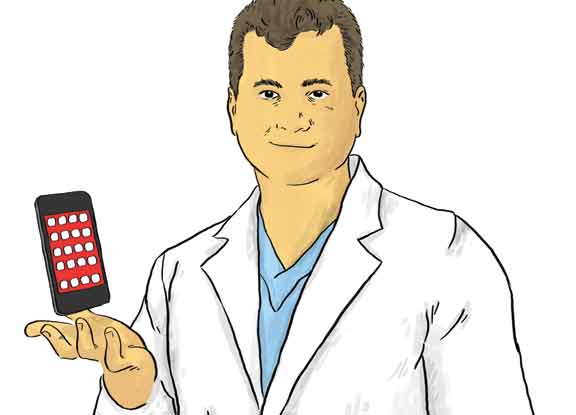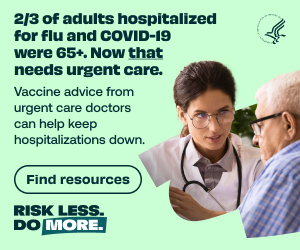When emergency physician Harvey Castro asked a nurse to start a dopamine dose for a hypotensive patient one day, he watched the nurse leave the room, find the book that could guide her to the titratable dose, look in the index and then flip through until she found what she needed. Castro wondered, Isn’t there a more efficient way?

When emergency physician Harvey Castro asked a nurse to start a dopamine dose for a hypotensive patient one day, he watched the nurse leave the room, find the book that could guide her to the titratable dose, look in the index and then flip through until she found what she needed. Castro wondered, Isn’t there a more efficient way?
While this may be a common sentiment in emergency medicine, this is where Castro’s story diverges from those of thousands of similarly-frustrated EPs. Instead of merely shaking his head, Castro, an emergency physician from Irving, Tex., set about building the solution that he sought, in the form of an iPhone application. Since then, Castro has become a respected medical app developer, building over 30 smartphone apps that do everything from help doctors calculate dosages to help patients find the emergency room with the shortest wait time.
When Castro started wondering if there was a faster way to calculate dosages, he knew nothing about app development; he didn’t even have an iPhone. In 2009, Castro bought his first iPhone, along with books and tutorials on developing mobile applications. To the chagrin of his wife, who scolded him for a hobby that took so much time after work, he spent hours learning how to develop simple designs, like a box that opens when you touch the screen. He loved the methodical, problem-solving aspect to development – an approach he learned in medical school when his teachers posed a problem and told him to go home and solve it.
He calculates that it took him at least 1,000 hours to build his first app, IV Meds: “I had to start from scratch.” Once he had a prototype, Castro applied to become an Apple developer and showed the beta version to the nurses in his emergency room, refining it based on their feedback. When Apple approved the app and it made its debut, he checked its ranking every hour and was shocked to see it hit the top 100 medical apps the first day. It’s hovered in the top 100 ever since.
Since that first tentative debut, Castro has grown from a novice developer into a medical app brand. Recently he added five employees to his company, Deep Pocket Series LLC, and has begun forming bigger partnerships. He is now partnering with the Hospital Corporation of America, the largest private hospital operator in the nation, on a project that allows hospitals to advertise their wait times. The FastERTX app premiered in early November with a publicity campaign in Dallas, Tex. As Texas hospitals update their wait times, the time is advertised on giant billboards and is accessible from the FastERTX app that Castro developed.
Castro expands the FastERTX project nationally on May 1, with a website that lets any health care provider update its wait time and news feeds on a website that then updates the app. Patients use the app to decide when to leave for the doctor or which doctor to go to for immediate care. A patient can also use the app to upload an image of the ailment – a skin rash or bruise, perhaps – and send it to the doctor before they even leave the house.
Developing apps has become a way of life for Castro, who has grown increasingly conscious of technological solutions to everyday problems. When a Wood’s lamp broke, he created an app that would mimic the fluorescent light of the lamp. He wanted to save time getting patients’ permission to photograph their injuries, so he created an app that allows a patient to sign, via mobile phone, a waiver. Castro can take a picture, send it to another doctor for consultation and have a printable waiver document on one device. He’s even created humorous apps. As a gag, Castro took three months and developed an app that mimics a defibrillator. It asks you to place your finger on the app as it analyzes rhythms, and then warns, “Shock advised – stand back!” “Kind of a geeky joke,” he admits, but it fools people: “One of the cardiologists would not put his finger on it.”
There are thousands of medical apps in the iTunes store, but few app developers are actually doctors, let alone practicing emergency physicians, a background that Castro believes helps him streamline the information and know what’s essential to his customers. Other dual-threat physician-programmers include Pascal Pfiffner, a Swiss medical student who has created Eponyms, a digital library of 1700 common and obscure medical eponyms. German doctors Philipp Börm and Dr. Andreas Bruckmeier have created apps and e-books to accompany their medical publishing business and Dr. Gregory Moore, an OBGYN, created an app that helps expectant mothers track pregnancy stages.
If the seeds for Castro’s ideas come from his training as a physician, they germinate in his active home life, where he has a constant source of inspiration and feedback. Castro’s wife, a nurse and personal trainer, tests his ideas and gives him the “busy mom” perspective. He used his four kids, aged 2 years old through 9, to test out an app that helps kids practice cursive writing. The smiling face of his five-year-old daughter is the icon for his Pedi Meds app, an app that calculates dosages for pediatricians. And his wife strikes a yoga pose for the icon of his Stress Index app, which asks 43 questions to gauge your stress level and then provides soothing and funny sounds, like a rain forest or a burp or a cheer, to relax you.
Castro loves that emergency medicine doesn’t limit him to a single specialty but lets him find solutions to all kinds of emergencies, from cardiac to bones and brain trauma: “I enjoyed just the different challenges that the speciality itself brings. You basically have to think out of the box.” There is no danger, he says, that he’ll become more interested in app developing than doctoring: “If you told me that I became a millionaire overnight, would I give up ER? No.”









1 Comment
Another of Dr. Castro’s apps likewise combines his concerns as a doctor and as a dad — this one, called BETTER LETTERS, is a multi-featured handwriting trainer.